中考初中助动词综合分析(全,含练习及答案)
助动词测试题目及答案解析

助动词测试题目及答案解析一、选择题1. 助动词“be”用于构成进行时态,下列哪个句子中的“be”用法正确?A. She is reading a book.B. He was went to the store.C. They are goes to school.D. We am going to the cinema.答案:A2. 下列哪个句子中的助动词“have”用于构成完成时态?A. I have finished my homework.B. She has go to the meeting.C. They had go to the party.D. He has been to the beach.答案:A3. 助动词“will”用于表示将来时态,下列哪个句子用法正确?A. She will go to the market.B. He will goes to the concert.C. They will be going to the park.D. We will are going to the zoo.答案:A4. 助动词“should”用于表示义务或建议,下列哪个句子用法正确?A. You should go to the doctor.B. They should goes to the library.C. He should be going to the gym.D. We should are going to the party.答案:A5. 助动词“can”用于表示能力,下列哪个句子用法正确?A. She can swim.B. He can to swim.C. They can be swimming.D. We can are swimming.答案:A二、填空题6. 助动词“do”用于构成疑问句或否定句,请在下列句子中填入正确的形式。
- I _______ (do) like chocolate.- They _______ (do not) want to go to the party.答案:do not; do7. 助动词“have”用于构成完成时态,请在下列句子中填入正确的形式。
初中情态动词综合分析(含例题和答案解析)(精华)

情态动词综合分析(全&含例题及答案解析)纵观近几年全国各地中考英语试题中的动词类,总会考到情态动词。
情态动词是一种本身有一定的词义,表示说话人的情绪、态度或与语气的动词,但不能单独作谓语,只能和其他动词原形构成谓语。
无人称和数的变化,情态动词后面跟的动词需用原形,否定式构成是在情态动词后面加“not ”。
个别情态动词有现在式和过去式两种形式,过去式用来表达更加客气,委婉的语气, 时态性不强,可用于过去,现在或将来。
情态动词属非及物动词,故没有被动语态。
后续目录:考点一:can ,may ,must 等情态动词在陈述句中的用法;考点二:含有情态动词的疑问句的回答;考点三:不同情态动词的否定意义也不同;考点四:情态动词的被动语态;情态动词易混点归纳;【情态动词例题解析】;情态动词特点考点一:can ,may ,must 等情态动词在陈述句中的用法:1. can 的用法:(1).表示能力、许可、可能性。
表示能力时一般译为“能、会”,即有种能力,尤其是生来具备的能力,此时may 和must 均不可代替它。
如:She can swim fast, but I can ’t .她能游得很快,但我不能。
I can see with my eyes. 我用眼睛看。
(2).表示许可,常在口语中。
如:You can use my dictionary. 你可以用我的字典。
(3).表示推测,意为“可能”,常用于否定句和疑问句中,此时can ’t 译为“ 不可能”。
如:Can the news be true? 这个消息会是真的吗?—Can it be our teacher?那个人有可能是我们老师吗?—No, it can ’t be our teacher. He is on a visit to the Great Wall.不可能。
咱们老师正在游览长城呢。
【例题】—I think Miss Gao must be in the library. She said she would go there. —No. She __bethere, I have just been there. A.can ’t B.mustn ’t C.needn ’t D.wouldn ’t【解析】根据下文“我刚去过那儿”可知,应为“ 不可能”,can ’t 表示推测[答案] A|精.|品.|可.|编.|辑.|学.|习.|资.|料.*|*|*|*||欢.|迎.|下.|载.2. could 的用法:(1).can 的过去式,意为“ 能、会”,表示过去的能力。
中考助动词练习题
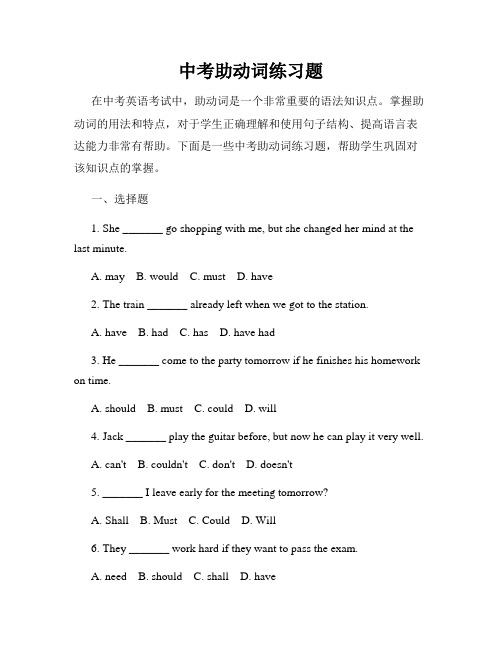
中考助动词练习题在中考英语考试中,助动词是一个非常重要的语法知识点。
掌握助动词的用法和特点,对于学生正确理解和使用句子结构、提高语言表达能力非常有帮助。
下面是一些中考助动词练习题,帮助学生巩固对该知识点的掌握。
一、选择题1. She _______ go shopping with me, but she changed her mind at the last minute.A. mayB. wouldC. mustD. have2. The train _______ already left when we got to the station.A. haveB. hadC. hasD. have had3. He _______ come to the party tomorrow if he finishes his homework on time.A. shouldB. mustC. couldD. will4. Jack _______ play the guitar before, but now he can play it very well.A. can'tB. couldn'tC. don'tD. doesn't5. _______ I leave early for the meeting tomorrow?A. ShallB. MustC. CouldD. Will6. They _______ work hard if they want to pass the exam.A. needB. shouldC. shallD. have7. _______ you like to come to our party this Friday?A. CanB. WouldC. MustD. Shall8. I _______ find my keys. Can you help me look for them?A. mayB. wouldC. mustD. have9. You _______ finish your homework before you watch TV.A. mayB. wouldC. mustD. have10. _______ I call you when I arrive at the airport?A. ShallB. MustC. CouldD. Will二、用适当的助动词填空1. We _______ attend the meeting yesterday because we were busy with another task.2. She _______ swim when she was only three years old.3. _______ I go to the library to borrow some books?4. They _______ go to school on weekends.5. He _______ have finished his homework by now.6. You _______ ask your teacher for help if you don't understand the question.7. She _______ be tired after a long day at work.8. _______ your father drive you to school every day?9. They _______ not play football in the park yesterday.10. _______ we start the meeting without the boss?三、将下列句子改写成否定句和疑问句1. He can swim.否定句:He _______ swim.疑问句:_______ he swim?2. She must finish her homework today.否定句:She _______ finish her homework today.疑问句:_______ she finish her homework today?3. They will come to the party.否定句:They _______ come to the party.疑问句:_______ they come to the party?4. We should clean our room every day.否定句:We _______ clean our room every day.疑问句:_______ we clean our room every day?5. You may borrow my pen.否定句:You _______ borrow my pen.疑问句:_______ you borrow my pen?以上是中考助动词练习题,希望能够帮助同学们更好地掌握助动词的用法和特点。
英语中考英语动词常见题型及答题技巧及练习题含答案
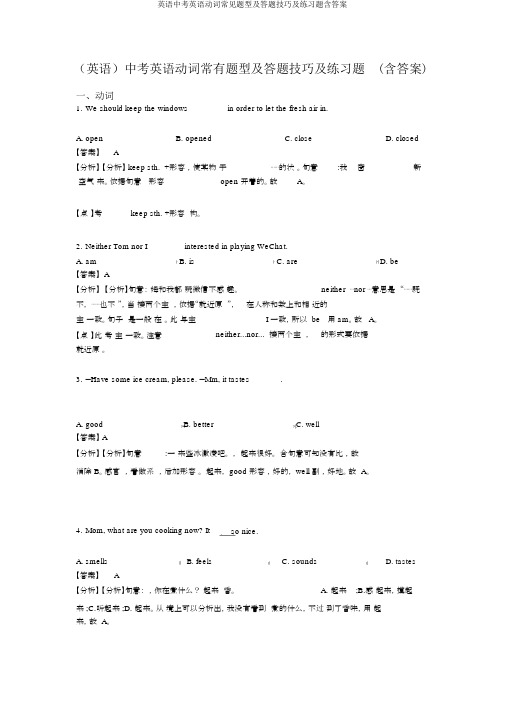
(英语)中考英语动词常有题型及答题技巧及练习题(含答案)一、动词1.We should keep the windows ________ in order to let the fresh air in.A. openB. openedC. closeD. closed 【答案】A:我窗__新【分析】【分析】 keep sth. +形容,使某物于⋯⋯的状。
句意空气来。
依据句意形容open 开着的。
故A。
【点】考keep sth. +形容构。
2.Neither Tom nor I________ interested in playing WeChat.A. amB. isC. areD. be【答案】 A【分析】【分析】句意:姆和我都玩微信不感趣。
neither ⋯nor ⋯意思是“⋯⋯既不,⋯⋯也不”,当接两个主,依据“就近原”,在人称和数上和相近的主一致。
句子是一般在。
此与主I 一致,所以 be 用 am。
故 A。
【点】此考主一致。
注意neither...nor... 接两个主,的形式要依据就近原。
3.—Have some ice cream, please. —Mm, it tastes_______.A. goodB. betterC. well【答案】 A【分析】【分析】句意:一来些冰激凌吧。
,起来很好。
合句意可知没有比,故消除 B。
感官,看做系,后加形容。
起来, good 形容,好的, well 副,好地。
故 A。
4.Mom, what are you cooking now? It so nice.A. smellsB. feelsC. soundsD. tastes 【答案】A【分析】【分析】句意:,你在煮什么?起来香。
A.起来;B.感起来,摸起来 ;C.听起来 ;D.起来。
从境上可以分析出,我没有看到煮的什么,不过到了香味,用起来,故 A。
5.—If you do that, you will _________ with an egg on your face.—But I won't regret it.A. take upB. end upC. keep upD. catch up 【答案】B【分析】【分析】句意:——假如你那样做,你最后会出洋相的。
2023年中考英语语法---动词及动词短语专题复习及练习题(含答案)

2023年中考英语语法---动词及动词短语专题复习及练习题(含答案)一、动词的基本框架动词包括实义动词、系动词、助动词和情态动词。
(一)实义动词实义动词是能独立作谓语的动词。
按其句法功能可分为及物动词和不及物动词;按其持续性可分为延续性动词和非延续性动词。
1.及物动词:及物动词本身意义不完整,需要接宾语才能使其意思完整。
(1)动词+宾语I like this book very much.我非常喜欢这本书。
(2)动词+宾语+宾补We call the bird Polly.我们叫这只鸟Polly。
I saw the children play in the park yesterday.昨天我看见孩子们在公园玩。
注意:用省略to的不定式或现在分词作宾补的动词有:have,see,watch,notice,hear等。
(3)动词+间接宾语+直接宾语Please pass me the salt.请把盐递给我。
常见的带双宾语的动词有:give,bring,buy,get,leave,lend,make,offer,pass,teach,tell等。
2.不及物动词不及物动词自身意思完整,不用接宾语。
Horses run fast.马跑得快。
(1)有些动词既可作及物动词又可作不及物动词。
We study English.我们学习英语。
(及物动词)We study hard.我们努力学习。
(不及物动词)(2)有些不及物动词与一些别的词搭配在一起构成动词短语,它的作用相当于一个及物动词。
①动词+介词Listen to the teacher carefully.仔细听老师讲。
此类动词短语后面的宾语无论是名词还是代词,都只能放在介词后面,不能放在动词和介词之间。
②动词+副词+介词Let’s go on with our work!让我们继续我们的工作吧!He gets along well with his classmates.他与他的同学们相处得很好。
初中英语2025届中考动词考点分类讲解练习(实义动词+系动词+助动词+情态动词)
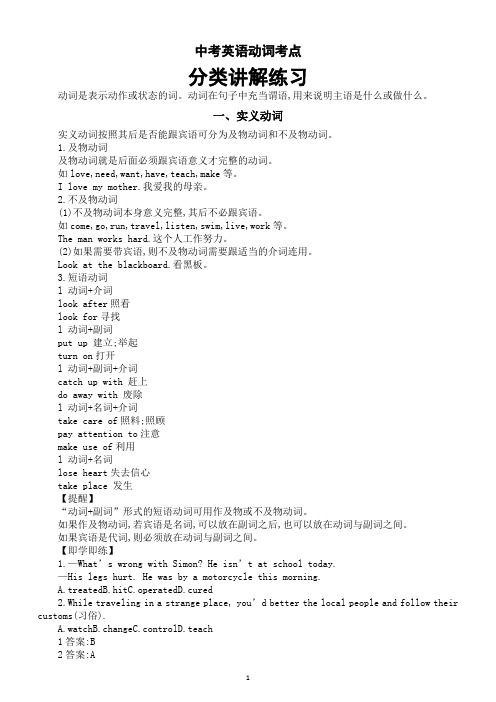
中考英语动词考点分类讲解练习动词是表示动作或状态的词。
动词在句子中充当谓语,用来说明主语是什么或做什么。
一、实义动词实义动词按照其后是否能跟宾语可分为及物动词和不及物动词。
1.及物动词及物动词就是后面必须跟宾语意义才完整的动词。
如love,need,want,have,teach,make等。
I love my mother.我爱我的母亲。
2.不及物动词(1)不及物动词本身意义完整,其后不必跟宾语。
如come,go,run,travel,listen,swim,live,work等。
The man works hard.这个人工作努力。
(2)如果需要带宾语,则不及物动词需要跟适当的介词连用。
Look at the blackboard.看黑板。
3.短语动词l 动词+介词look after照看look for寻找l 动词+副词put up 建立;举起turn on打开l 动词+副词+介词catch up with 赶上do away with 废除l 动词+名词+介词take care of照料;照顾pay attention to注意make use of利用l 动词+名词lose heart失去信心take place 发生【提醒】“动词+副词”形式的短语动词可用作及物或不及物动词。
如果作及物动词,若宾语是名词,可以放在副词之后,也可以放在动词与副词之间。
如果宾语是代词,则必须放在动词与副词之间。
【即学即练】1.—What’s wrong with Simon? He isn’t at school today.—His legs hurt. He was by a motorcycle this morning.A.treatedB.hitC.operatedD.cured2.While traveling in a strange place, you’d better the local people and follow their customs(习俗).A.watchB.changeC.controlD.teach1答案:B2答案:A二、系动词系动词不能单独作谓语,必须与表语一起构成谓语。
中考英语复习专题七(含答案) 助动词和情态动词

专题七助动词和情态动词一、用适当的情态动词填空。
1. —Would you like to go swimming with me this afternoon?—I’d love to, but I’m afraid I _______. I have too much work to do.2. You _______ swim in this part of the lake. It’s dangerous.3. —________ I use your dictionary?—Of course you can.4. —________ I know your name?—Sure. My name is Han Huimei.5. I don’t understand this sentence. ________ you explain it to me?6. —________ I tell him the truth right now?—No, you ________. You can tell him about it later.7. —That sweater _______ be yours.—No, it _______ be mine. Mine is over there.8. Jim left his English book at home. He _______ borrow one from other students.9. _______ you have a merry Christmas and happy New Year!10. —May I pick a flower in the garden?—No, you _______.二、改正下列句子中的一处错误。
1. Must I know your name, please?2. They’ll go swimming next Saturday and so do we.3. —It must be our monitor.—No, it mustn’t be him. He has gone home.4. You’d better to help him with his English.5. With your help, we will able to finish the work on time.6. Will you like to join us in the singing contest?7. He had not better talk in class. The teacher will get angry.8. —Could I use your cell phone?—Yes, you could.9. Will I help you carry the suitcase?10. —Must I report this to our head teacher now?—No, you mustn’t.三、选用括号中适当的词填空。
助动词(单选题)(20题含解析)中考英语专题练习

助动词(单选题)中考英语专题练习(20题含解析)全国通用一、单选题(共20题)1.I ________ my homework yesterday.A.don't do B.didn't do C.didn't D.doesn't do 2.— Does your sister eat very ____ at school? — Yes, she ____.A.good, do B.well, does C.well, is D.good, does 3.They __________ lunch at home every day.A.not B.not have C.don't D.don't have 4.I don't have a Ping-Pong ball, _______ my brother _______.A.but; do B.and; does C.and;do D.but; does 5.—Do you have a pen?—Yes, I ________A.does B.do C.has D.am 6.—________ your sister ________ music?—Yes, she does.A.Is; like B.Does; likes C.Do; like D.Does; like 7.- everyone in your family the Chinese New Year?-Yes,of course.A.Do,like B.Is,like C.Is,likes D.Does,like 8.Paul is crazy about basketball, but he ______ football very often.A.doesn’t play B.isn’t playingC.didn’t play D.won’t play9.Peter_____ his homework after nine o'clock in the evening.A.doesn't do B.does not C.isn't do D.isn't doing 10.----How ________ you spell pen? ----P-E-N, pen.A.is B.am C.do D.are 11.Ann doesn't like oranges, but Nick and Tom________A.like B.does C.do D.likes 12.What they every evening?A.are; do B.do; doC.are; doing D.does; do13.Darning doesn’t ________ his homework after supper. He watches TV.A.does B.do C./ D.doing 14.We _________ to buy any fruit. There’s enough for the party.A.don’t need B.not need C.doesn’t need D.needn’t15.—Where_______she _________ ?—She lives in Beijing.A.does; live in B.does; lives in C.is; lives D.does; live16.—I used to eat a lot of junk food.—________.A.So do I B.Neither do I C.So did I D.Neither did I 17.— ________ you have a soccer ball?—Yes, I ___________.A.Are, am B.Do, do C.Do, am D.Am, do 18.—Where_______she _________ ?—She lives in Beijing.A.does; live in B.does; lives in C.is; lives D.does; live19.- Does he have any paper clips?- No, he__A.does B.isn’t C.don’t D.doesn’t20.-___________ you feel scared when you saw the big snake? -No, I didn’t feel scared at all. A.Do B.Did C.Was D.Were【参考答案】一、单选题(共20题)1.B【详解】句意:昨天我没有做家庭作业。
中考英语专项复习专题【动词时代】(附例题以及答案)
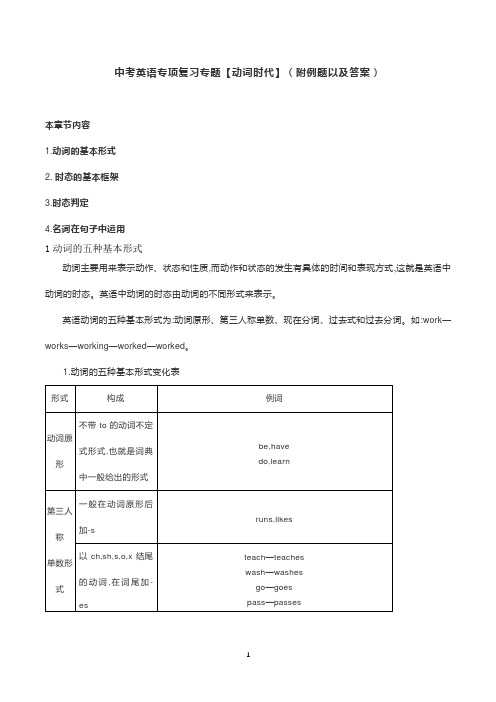
中考英语专项复习专题【动词时代】(附例题以及答案)本章节内容1.动词的基本形式2. 时态的基本框架3.时态判定4.名词在句子中运用1动词的五种基本形式动词主要用来表示动作、状态和性质,而动作和状态的发生有具体的时间和表现方式,这就是英语中动词的时态。
英语中动词的时态由动词的不同形式来表示。
英语动词的五种基本形式为:动词原形、第三人称单数、现在分词、过去式和过去分词。
如:work—works—working—worked—worked。
1.动词的五种基本形式变化表2时态的基本框架常见六种时态的构成及用法(1)一般现在时用法:①现在经常性的状态或动作;②客观事实和真理。
构成:①be+表语;②实义动词作谓语标志词:often, sometimes, usually, always, never,twice a month, every day/week/month/year(every系列)例句:He usually gets to school early.他通常很早到校。
The moon moves around the earth.月亮绕着地球转。
练一练1.认识从实践开始Knowledge practice.2.如果明天下雨,我们就不去公园了。
If it tomorrow,we to the park.【答案】1. begins with.2.rains,won’t go(2)一般过去时用法:表示过去的动作或状态。
构成:①was/were+表语;②实义动词作谓语标志词:a moment ago,just now,ago, yesterday, last night/week/month(last系列)例句:We went to Yunnan last Monday.上周一我们去了云南。
1.She (not visit)her aunt last weekend.2.My friend,Lucy, (study)for the math test and (practice)English last night. 【答案】1.didn’t visit 2.studied practiced(3)一般将来时用法:表示将来的动作或状态。
助动词do和does专题练习(附答案)

助动词do/does的用法专题助动词do与does口诀(一)(do ) 变句型,先观察,述句中动用原, 一般疑问do提前,否定don’t 实动前。
(二)(does) 若是主语为三单,述句中动变形,一般疑问也简单,does放在句子前,否定doesn’t实动前,主动出现动还原。
总结:含有实义动词的句子,进行句子转换时应借助于助动词do/does,主语是三单(he,she,it)时用does,其他用do。
否定句在动词原形前加don’t /doesn’t,一般疑问句把do/does 提前,特殊疑问句由特殊疑问词+一般疑问句。
句子类型及结构肯定句:主语+动词+其它。
主语是三单,动词用三单I like this blue sweater. Tom likes this blue sweater.我喜欢这件蓝色的毛衣。
Tom喜欢这件蓝色的毛衣。
Tom likes English.Tom喜欢英语。
I like this blue sweater.Tom likes English.否定句:主+ don’t/doesn’t+动原+其它I don’t like this blue sweater.我不喜欢这件蓝色的毛衣。
Tom doesn’t like English.Tom不喜欢英语。
I like this blue sweater.Tom likes English.一般疑问句:do/does提前,其它照抄不变(Do /Does+主+动原+其它?),一人称变二人称。
回答:Yes,主+do/does. No,主+ don’t/doesn’t.Do you like this blue sweater?Yes, I do. / No, I don’t.你喜欢这件蓝色的毛衣吗?是的,我喜欢; 不,我不喜欢。
Does Tom like English?Yes,he does. /No.he doesn’t.Tom喜欢英语吗?是的,他喜欢;不,他不喜欢。
中考英语动词常见题型及答题技巧及练习题(含答案)

中考英语动词常见题型及答题技巧及练习题(含答案)一、动词1.She works very hard, so she will ____ in ____ the exam.A. successful; passB. success; passingC. succeed; passingD. successful; passing【答案】 C【解析】【分析】句意:他学习很努力,所以她将成功地通过考试。
will+动词原形。
succeed in doing sth。
故选C。
【点评】考查动词的固定搭配。
2.- Who your pet dogs while you were out for a holiday? – My neighbor, a warm-hearted woman.A. put onB. looked afterC. gave upD. turned off【答案】 B【解析】【分析】考查动词辨析。
句意:当你外出度假时,谁照顾你的宠物狗?-----我的邻居,一个热心的女人。
A.穿,张贴;B.照顾;C.放弃;D.关。
结合句意可知选B。
3.Grandfather lives with us. We all ________ him.A. look atB. look forC. look afterD. look like【答案】 C【解析】【分析】句意:爷爷和我们住在一起,我们都照顾他。
A. look at看;B. look for 寻找;C. look after照顾;照看;D. look like看起来像…;根据语境及意义,故选C。
【点评】动词词组的意义多与组合所使用的词有关,学生要注意体会记忆。
4.This kind of cloth _ soft.A. feelsB. tastesC. smells【答案】A【解析】【分析】句意:这种布摸起来是柔软的。
A.感觉,触摸;B.尝起来;C.闻起来。
(英语)中考英语动词常见题型及答题技巧及练习题(含答案)
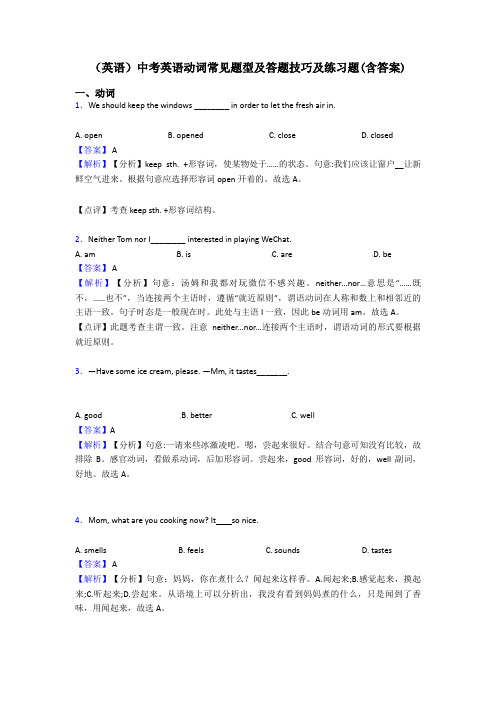
(英语)中考英语动词常见题型及答题技巧及练习题(含答案)一、动词1.We should keep the windows ________ in order to let the fresh air in.A. openB. openedC. closeD. closed【答案】 A【解析】【分析】keep sth. +形容词,使某物处于……的状态。
句意:我们应该让窗户__让新鲜空气进来。
根据句意应选择形容词open开着的。
故选A。
【点评】考查keep sth. +形容词结构。
2.Neither Tom nor I________ interested in playing WeChat.A. amB. isC. areD. be【答案】 A【解析】【分析】句意:汤姆和我都对玩微信不感兴趣。
neither…nor…意思是“……既不,……也不”,当连接两个主语时,遵循“就近原则”,谓语动词在人称和数上和相邻近的主语一致。
句子时态是一般现在时。
此处与主语I 一致,因此be动词用am。
故选A。
【点评】此题考查主谓一致。
注意neither...nor...连接两个主语时,谓语动词的形式要根据就近原则。
3.—Have some ice cream, please. —Mm, it tastes_______.A. goodB. betterC. well【答案】A【解析】【分析】句意:一请来些冰激凌吧。
嗯,尝起来很好。
结合句意可知没有比较,故排除B。
感官动词,看做系动词,后加形容词。
尝起来,good形容词,好的,well副词,好地。
故选A。
4.Mom, what are you cooking now? It so nice.A. smellsB. feelsC. soundsD. tastes【答案】 A【解析】【分析】句意:妈妈,你在煮什么?闻起来这样香。
A.闻起来;B.感觉起来,摸起来;C.听起来;D.尝起来。
2023年中考英语备考助动词练习题(附答案)
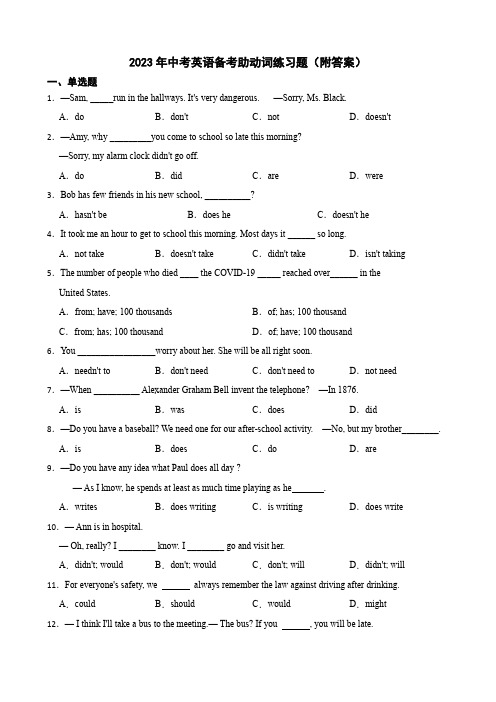
2023年中考英语备考助动词练习题(附答案)一、单选题1.—Sam, _____run in the hallways. It's very dangerous. —Sorry, Ms. Black.A.do B.don't C.not D.doesn't 2.—Amy, why _________you come to school so late this morning?—Sorry, my alarm clock didn't go off.A.do B.did C.are D.were3.Bob has few friends in his new school, __________?A.hasn't be B.does he C.doesn't he4.It took me an hour to get to school this morning. Most days it ______ so long.A.not take B.doesn't take C.didn't take D.isn't taking 5.The number of people who died ____ the COVID-19 _____ reached over______ in the United States.A.from; have; 100 thousands B.of; has; 100 thousandC.from; has; 100 thousand D.of; have; 100 thousand6.You _________________worry about her. She will be all right soon.A.needn't to B.don't need C.don't need to D.not need 7.—When __________ Alexander Graham Bell invent the telephone? —In 1876.A.is B.was C.does D.did8.—Do you have a baseball? We need one for our after-school activity. —No, but my brother________.A.is B.does C.do D.are9.—Do you have any idea what Paul does all day ?— As I know, he spends at least as much time playing as he .A.writes B.does writing C.is writing D.does write 10.— Ann is in hospital.— Oh, really? I ________ know. I ________ go and visit her.A.didn't; would B.don't; would C.don't; will D.didn't; will 11.For everyone's safety, we always remember the law against driving after drinking.A.could B.should C.would D.might12.— I think I'll take a bus to the meeting.— The bus? If you , you will be late.A.do B.have done C.will do13.–Oh, no! I can't find my mobile phone!—Well, where you last put it?A.have B.do C.did 14.Everyone except Tom and John _______ seen the film.A.is B.has C.are D.have 15.—Becky doesn't talk much, she?—Yes, she does.A.will B.did C.does二、填空题16.Words written alike are often pronounced d in English.三、单词拼写(词汇运用)17.She's never been to Canada, h she?四、句型转换18.I brush my teeth twice a day. (改为否定句)I my teeth twice a day.19.The old couple made their living by selling vegetables. (对划线部分提问)the old couple make their living?20.Jeff does some volunteer work in the community every month. (改为一般疑问句)Jeff do volunteer work in the community every month?21.Didn't he see you just now? (根据句意做出肯定或否定回答), he . He said hello to me.22.He has some good ideas.(改为否定句)He have good ideas.23.Our monitor shared some of her opinions on how to be independent in life. (改为否定句) Our monitor share of her opinions on how to be independent in life. 24.He followed his doctor's advice to live on some low-fat food. (对划线部分提问)advice he follow to live on some low-fat food?25.The little baby gets dressed at seven. (改为否定句)The little baby dressed at seven.26.I play basketball after school every day.(改为一般疑问句)you basketball after school every day?答案1.B 2.B 3.B 4.B 5.B 6.C 7.D 8.B 9.B 10.D 11.B 12.A 13.C 14.B 15.C 16.故填differently 17.Has 18.don't;brush 19.How;did 20.Does;any 21.Yes;did 22.doesn't;any 23.didn't;any 24.Whose;did 25.doesn't;get 26.Do;play。
中考英语总复习动词的分类用法(基础知识)习题及答案
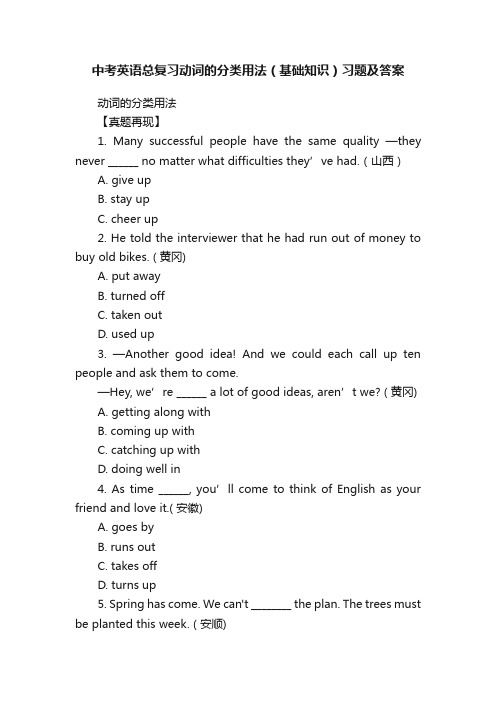
中考英语总复习动词的分类用法(基础知识)习题及答案动词的分类用法【真题再现】1. Many successful people have the same quality —they never ______ no matter what difficulties they’ve had.(山西)A. give upB. stay upC. cheer up2. He told the interviewer that he had run out of money to buy old bikes. ( 黄冈)A. put awayB. turned offC. taken outD. used up3. —Another good idea! And we could each call up ten people and ask them to come.—Hey, we’re ______ a lot of good ideas, aren’t we? ( 黄冈)A. getting along withB. coming up withC. catching up withD. doing well in4. As time ______, you’ll come to think of English as your friend and love it.( 安徽)A. goes byB. runs outC. takes offD. turns up5. Spring has come. We can't ________ the plan. The trees must be planted this week. ( 安顺)A. put offB. make upC. come up withD. look up6. It ________ about eight minutes for sunlight (阳光) to travel from the sun to the earth. ( 临沂)A. takesB. spendsC. costsD. pays7. —Don't ______ late, Mary. You have a singing competition tomorrow morning.—Ok, dad, I'll go to bed right now. ( 温州)A. dress upB. grow upC. stay upD. mix up8. — Mum, shall we go to the beach tomorrow? ( 广东)— It ______ the weather.A.carries on B.lives on C.depends on D.holds on9. Our government has tried many ways to ________ the smog(雾霾) problem.Maybe we’ll havea clear sky in the near future. ( 哈尔滨)A.put away B.work out C. come up10. Life is a journey with trouble, but with care and wisdom you can ________ any problem you face. ( 常州)A. work outB. hand outC. find outD. put out11. Lao She’s Teahouse ______ the changes in Chinese society over fifty years.( 天津)A. describesB. improvesC. preparesD. corrects12. Fresh food is good for you. But you have to _______ it first because sometimes it is a little dirty. ( 江西)A. tasteB. smellC. washD. plant【答案与解析】1. A。
初中助动词试题及答案
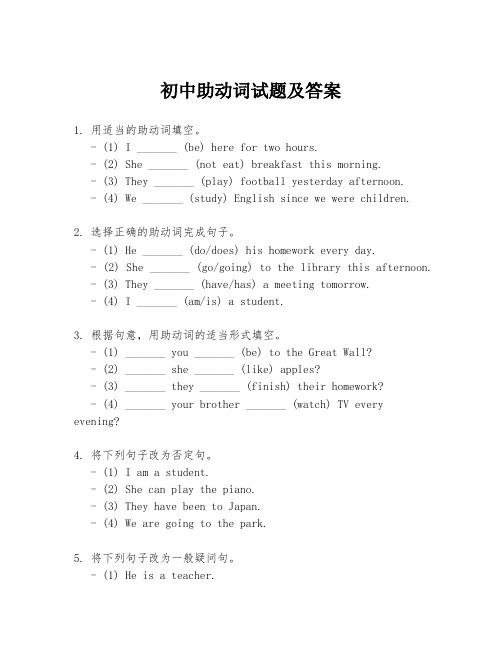
初中助动词试题及答案1. 用适当的助动词填空。
- (1) I _______ (be) here for two hours.- (2) She _______ (not eat) breakfast this morning.- (3) They _______ (play) football yesterday afternoon.- (4) We _______ (study) English since we were children.2. 选择正确的助动词完成句子。
- (1) He _______ (do/does) his homework every day.- (2) She _______ (go/going) to the library this afternoon. - (3) They _______ (have/has) a meeting tomorrow.- (4) I _______ (am/is) a student.3. 根据句意,用助动词的适当形式填空。
- (1) _______ you _______ (be) to the Great Wall?- (2) _______ she _______ (like) apples?- (3) _______ they _______ (finish) their homework?- (4) _______ your brother _______ (watch) TV every evening?4. 将下列句子改为否定句。
- (1) I am a student.- (2) She can play the piano.- (3) They have been to Japan.- (4) We are going to the park.5. 将下列句子改为一般疑问句。
- (1) He is a teacher.- (2) She has a new bike.- (3) They were at home last night. - (4) I can swim.答案:1.- (1) have been- (2) didn't eat- (3) played- (4) have been studying2.- (1) does- (2) is going- (3) have- (4) am3.- (1) Have, been- (2) Does, like- (3) Have, finished- (4) Does, watch4.- (1) I am not a student.- (2) She cannot play the piano.- (3) They have not been to Japan. - (4) We are not going to the park.5.- (1) Is he a teacher?- (2) Has she a new bike?- (3) Were they at home last night? - (4) Can I swim?。
十一、中考英语助动词练习题(附答案)

十一、中考英语助动词练习题(附答案)1.If it is fine tomorrow, we ______ a football match.a. haveb. will havec. hasd. shall has2.When he was at school, he ______ early and take a walk before breakfast.a. will riseb. shall rise b. should rise would rise3.In the past 30 years China ______ great advances in the socialist revolution and socialist construction.a. has madeb. have madec. had maded. having made4.I ______ go to bed until I ______ finished my work.a. don’t/hadb. didn’t/havec. didn’t/hadd. don’t/have5.______ you think he ______ back by dinner time?a. Do/have comeb. Did/will have comec. Does/will comed. Do/will have come6.He said that he dropped his bag when he ______ for the bus.a. was runingb. was runningc. were runningd. is running7.No sooner ______ he arrived home than he ______ to start on another journey.a. has/was askedb. have/were askedc. had/is askedd. had/was asked8.“______ you give me a room for the night?” I asked on arriving at the hotel.a. Shouldb. Canc. Mightd. May9.There are nine of them, so ______ get into the car at the same time.a. they may not at allb. all they may notc. they can’t alld. all they can’t10.“We didn’t see him at the lecture yesterday.” “He ______ it.”a. mustn’t attendb. cannot have attendedc. would have not attendedd. needn’t have attended11.“You realize that you were driving at 100 mph, don’t you?”“No, officer. I ______. This car can’t do more than 80.”a. didn’t need to beb. may not have beenc. couldn’t have beend. needn’t have been12.he was a good runner so he ______ escape from the police.a. mightb. succeeded toc. wouldd. was able to13.If they ______, our plan will fall flat.a..are co-operatingb. had not co-operatedc. won’t co-operated. didn’t co-operate14.I hoped ______ my letter.a. her to answerb. that she would answerc. that she answersd. her answering15.He ______ live in the country than in the city.a. prefersb. likes toc. had betterd. would rather16.______ to see a film with us today?a. Did you likeb. Would you likec. Will you liked. Have you liked17.I’m sorry, but I had no alternative. I simply ______ what I did.a. must dob. had to doc. ought to have doned. have to do18.“Time is running out,______?”a. hadn’t we better got startb. hadn’t we better get startb. hadn’t we better get started d. hadn’t we better not started19.No one ______ that to his face.a. dares sayb. dares sayingc. dare sayd. dare to say20.The students in the classroom ______ not to make so much noise.a. needb. oughtc. mustd. dare21.You ______ last week if you were really serious about your work.a. ought to comeb. ought to be comingc. ought have comed. ought to have come22.The elephants ought ______ hours ago by the keepers.a. to be fedb. to feedc. to being fedd. to have been fed23.“I wonder why they’re late.” “They ______ the train.”a. can have missedb. could missc. may have missedd. might miss24.“Tom graduated from college at a very young age.”“He ______ have been an outstanding student.”a. mustb. couldc. shouldd. might25.You ______ the examination again since you had already passed it.a. needn’t have takenb. didn’t need to takec. needn’t taked. mustn’t take26.He is really incompetent! The letter ______ yesterday.a. should be finished typingb. must be finished typingb. must have finished typingc. should have been finished typing27.The boy told his father that he would rather ______ an astronaut.a. becomeb. to becomec. becomingd. became28.When we reached the station, the train had still notarrived; so we ______.a. needed not to hurryb. needn’t have hurriedc.need not to have hurriedd. didn’t need to hurry29.Since your roommate is visiting her family this weekend,_____ you like to have dinner with us tonight?a. willb. won’tc. wouldn’td. do30.He was afraid what he had done ______ a disastrous effect on his career.a. might haveb. could bec. have beend. shall be31.He ______ hardly say anything more, since you know about it.a. don’t need tob. needn’tc. needsd. need32.You ______ the look on his face when he won the prize.a. would have seenb. should have seenc. must seed. can be seeing33.Some people think the stock market will crash, but ______.a. I wonder if it happensb. I doubt if it will happenc. I am afraid it wouldn’t happend. I doubt if it does happen34.“Whatever has happened to George?” “I don’t know. He ______ lost.”a. can have gotb. may have gotc. might getd. could get35.He has no idea what the book is about. He ______read the book.a. couldn’tb. couldn’t havec. mightn’t haved. shouldn’t have36.New studies show that two of Saturn’s rings ______ longer than the 4.5 billion years since the birth of the Solar System.a. could have lastedb. should have lastedc. would have lastedd. must be lasting37.Take the telescope with you in case you ______ it in your expedition.a. will needb. would needc. should needd. could need38.Need he come at once? Yes, he ______.a. mustb. must notc. needd. may39.Please answer the phone. It ______ be by your father. If it is, would you tell that I want to see him?a. willb. shouldc. wouldd. could40.We’ll never give in whatever they ______ say or do.a. mayb. willc. shalld. should41.With all this work on hand, he ______ to the cinema last night.a. mustn’t gob. wouldn’t goc. oughtn’t god. shouldn’t have gone42.Everyone ______ the cake because there wasn’t even a small piece left.a. must likeb. must have likedc. must have been likingd. had liked43.I wish to recollect where I met her, ______?a. would Ib. may Ic. may not Id. can I44.I ______ think he will ______ dare the risk.a. not/ ..b. do/notc. ../notd. don’t/..45.If reading is to accomplish anything more than passing time, it ______ beactive.a. may notb. mustc. mightd. is not46.You ______ your seats today if you want to go to the game.a. had better to reserveb. had better reservec. had to better reserved. had to reserve better47.I ______ the operation unless it is absolutely necessary.a. would rather not haveb. would not rather hadb. rather would not have d. rather not would have48.Many scientists ______ their own eyes and ears than the theories of theancients.a. would rather to believeb. would rather believec. rather would believed. will rather believe49.To travel from England to Scotland you ______ a passport.a. haven’t gotb. mustn’t havec. needn’td. don’t need50.One of the statements ______ to be untrue.a. is turned outb. has turned outc. have been turned outd. have turned out51.I don’t know whether it will rain or not, but if it ______ rain, I shall stay at home.a. willb. didc. doesd. shall52.“You’d like some tea,______?”a. wouldn’t youb. shouldn’t youc. hadn’t youd. didn’t you53.“May we take the books out?”a. No, you may notb. No, you can notc. No, you can’td. Please don’t54.“I would have come sooner, but I ______ that you were waiting.”a. didn’t knowb. hasn’t knownc. hadn’t knowd. haven’t known55.If y ou don’t want to, you ______ to get there with us.a. mustn’tb. can’tc. don’t haved. have not56.I would go to visit them but I ______ think they are anxious to see me.a. haven’tb. don’tc. doesn’td. didn’t57.Whatever you can do,______.a. I can do so as wellb. I can do this as wellb.I can do it as well d. I can do as well58._____- I realized the consequences I would never have contemplated getting involved.a. Hadb. Havec. Havingd. Has59.“Perhaps she is working for John.” “Yes, she ______ for him.”a.need have been workingb. may be workingb.ought have been working d. ought be working60.“I know she was in because I heard her radio, but she didn’t open the door.” “She ______ the bell.”a. may not be hearingb. may not have heardb.must not have heard d. must not be hearing61. “He was smoking.” “Then he ______ .”a.ought to have been not smokingb. ought to have not been smokingb.ought not to have been smoking d. ought to not have been smoking62.You ______ out yesterday without a coat. No wonder you caught cold.a. oughtn’t have goneb. shouldn’t have gonec. mustn’t have goned. can’t have gone63.“Paul was riding a bicycle along the motorway when he was hit by the trailer ofa lorry.”“He _____ a bicycle along the motorway; bicycles are not allowe d.”a. shouldn’t have been ridingb. couldn’t have been ridingc.oughtn’t have been ridingd. can’t have been riding64.I am listening. But you ______.a. need be listeningb. should be listeningc. need have been listeningd. ought be listening65.He ______ with us last night.a.would have liked to gob. should like to be goingb.should be liked to go d. would like to go66.I ______ his face when he opened the letter.a. should like you to seeb. would have liked you to be seenb.should like you to have seen d. would like you to see67.You say you ______ do it, but I say you ______ do it.a. ought not/couldb. will not/shallc. could not/needd. shall not/ought68.We ______ put the meeting off for a week.a. can as wellb. will as wellc. shall as welld. may as well69.______ wind your watch every day?a. Do you needb. Must you have toc. Have you tod. Do you have to70.______ give him a chance to try?a. Oughtn’t to web. Oughtn’t we toc. Ought to we notd. Oughtn’t we71.“Did you blame him for his mistakes?” “______”a. I’d rather not dob. I’d not rather doc. I’d better not dod. I’d rather not doing72.You had better ______ your hair cut.a. hadb. havec. to getd. to have73.My sister didn’t go to the party last night because she ______ the baby for her friend until 9:30.a.must have looked afterb. would have to look afterb.had to look after d. should have looked after74.Mary is very late, she ______.a.may miss her trainb. may have missed her trainc.must miss her traind. could miss her train75.No matter what you may say, he ______ to his own views.a.would always stickb. will always stickc. should always stickd. must always stick to76.It’s wonderful that you ______ have achieved s o much in these years.a. mayb. canc. shouldd. would77.The students asked whether he ______ take the books out of the reading-room.a. couldb. mightc. shouldd. would78.He ______ still be thinking about the question you raised.a. mayb. mightc. mustd. should79.I’d be glad if you______ give me a n account of the fact.a.shallb. shouldc. wouldd. may80.He ______ accomplish the task in time.a. didb. hasc. isd. do1 B 19 C 37 C 55 C 73 C2 D 20 B 38 A 56 B 74 B3 A 21 D 39 D 57 D 75 B4 C 22 D 40 A 58 A 76 C5 D 23 C 41 D 59 B 77 A6 B 24 A 42 B 60 B 78 B7 D 25 B 43 B 61 C 79 C8 B 26 D 44 D 62 B 80 A9 C 27 A 45 B 63 A 8110 B 28 B 46 B 64 B 8211 C 29 C 47 A 65 A 8312 D 30 A 48 B 66 C 8413 C 31 D 49 D 67 B 8514 B 32 B 50 B 68 D 8615 D 33 B 51 C 69 D 8716 B 34 B 52 A 70 B 8817 B 35 B 53 D 71 A 8918 C 36 A 54 A 72 B 901.If it is fine tomorrow, we ______ a football match.a. haveb. will havec. hasd. shall has2.When he was at school, he ______ early and take a walk before breakfast.a. will riseb. shall rise b. should rise would rise3.In the past 30 years China ______ great advances in the socialist revolution and socialist construction.a. has madeb. have madec. had maded. having made4.I ______ go to bed until I ______ finished my work.a. don’t/hadb. didn’t/havec. didn’t/hadd. don’t/have5.______ you think he ______ back by dinner time?a. Do/have comeb. Did/will have comec. Does/will comed. Do/will have come6.He said that he dropped his bag when he ______ for the bus.a. was runingb. was runningc. were runningd. is running7.No sooner ______ he arrived home than he ______ to start on another journey.a. has/was askedb. have/were askedc. had/is askedd. had/was asked8.“______ you give me a room for the night?” I asked on arriving at the hotel.a. Shouldb. Canc. Mightd. May9.There are nine of them, so ______ get into the car at the same time.a. they may not at allb. all they may notc. they can’t alld. all they can’t10.“We didn’t see him at the lecture yesterday.” “He ______ it.”a. mustn’t attendb. cannot have attendedc. would have not attendedd. needn’t have attended11.“You realize that you were driving at 100 mph, don’tyou?”“No, officer. I ______. This car can’t do more than 80.”a. didn’t need to beb. may not have beenc. couldn’t have be end. needn’t have been12.he was a good runner so he ______ escape from the police.a. mightb. succeeded toc. wouldd. was able to13.If they ______, our plan will fall flat.a. are co-operatingb. had not co-operatedc. won’t co-operated. didn’t co-operate14.I hoped ______ my letter.a. her to answerb. that she would answerc. that she answersd. her answering15.He ______ live in the country than in the city.a. prefersb. likes toc. had betterd. would rather16.______ to see a film with us today?a. Did you likeb. Would you likec. Will you liked. Have you liked17.I’m sorry, but I had no alternative. I simply ______ what I did.a. must dob. had to doc. ought to have doned. have to do18.“Time is running out,______?”a. hadn’t we better got startb. hadn’t we better get startc.hadn’t we better get startedd. hadn’t we better not started19.No one ______ that to his face.a. dares sayb. dares sayingc. dare sayd. dare to say20.The students in the classroom ______ not to make so much noise.a. needb. oughtc. mustd. dare21.You ______ last week if you were really serious about your work.a. ought to comeb. ought to be comingc. ought have comed. ought to have come22.The elephants ought ______ hours ago by the keepers.a. to be fedb. to feedc. to being fedd. to have been fed23.“I wonder why they’re late.” “They ______ the train.”a. can have missedb. could missc. may have missedd. might miss24.“Tom graduated from college at a very young age.”“He ______ have been an outstanding student.”a. mustb. couldc. shouldd. might25.You ______ the examination again since you had already passed it.a. needn’t have takenb. didn’t need to takec. needn’t taked. mustn’t take26.He is really incompetent! The letter ______ yesterday.a. should be finished typingb. must be finished typingc.must have finished typing c. should have been finished typing27.The boy told his father that he would rather ______ an astronaut.a. becomeb. to becomec. becomingd. became28.When we reached the station, the train had still not arrived; so we ______.a. needed not to hurryb. needn’t have hurriedc. need not to have hurriedd. didn’t need to hurry29.Since your roommate is visiting her family this weekend,_____ you like to have dinner with us tonight?a. willb. won’tc. wouldn’td. do30.He was afraid what he had done ______ a disastrous effect on his career.a. might haveb. could bec. have beend. shall be四.答案1-10 BDACDBDBCB 11-20 CDCBDBBCCB 21-30 DDCABDABCA。
初中英语助动词、使役动词强化练习(附答案)

初中英语助动词、使役动词强化练习(附答案)学校:___________姓名:___________班级:___________考号:___________ 一、单项选择1.Tony and Jim visited their English teacher last week, but Lucy _______.A.wasn’t B.doesn’t C.didn’t D.don’t2.A: My mother makes me _________ a lot of extra homework every weekend.B: Oh, I am so sorry to hear that.A.to do B.do C.does D.doing3.What ________ your sister usually do at home?A.did B.do C.is D.does4.It’s Sunday! You ________ wear the school uniform.A.have to B.don’t have to C.doesn’t have to5.— What do you think of the school uniform?— Very good. It makes me ________ comfortable.A.feel B.to feel C.feels D.feeling6.The mother makes her son ________ his room every day.A.clean B.to clean C.cleaning D.cleans7.The picture made me ________ my childhood.A.think of B.think about C.think over D.thought of 8.We will go for a picnic if it ________ rain this Sunday.A.doesn’t B.won’t C.isn’t D.didn’t9.________ you learn ________ when you were in the countryside?A.Did; something useful B.Did; anything usefulC.Do; useful anything D.Do; useful something10.Mr. Li makes me ________, because it is bad for my health.A.not to smoke B.not smoke C.not smoking11.Hi, Mary, nice to meet you again. We ________ each other since 2017.A.won’t see B.don’t see C.did n’t see D.haven’t seen 12.—________ Tom and Jack like rice?—No, ________.A.Is; he isn’t B.Are; they aren’tC.Does; he doesn’t D.Do; they don’t13.I don’t have a dictionary, but Alan ________.A.do B.does C.have D.has14.He _________ his homework _________ Sundays.A.doesn’t; on B.don’t do; in C.don’t do; on D.doesn’t do; on15.— What time does Jane _________ after school?— At about 6:00.A.do her homework B.does her homeworkC.do her homeworks D.does her homeworks16.My brother Alan ________ a ping-pong ball, but I do.A.doesn’t have B.don’t have C.has D.have17.His words don’t seem surprising, _________?A.does he B.isn’t he C.do they D.aren’t they18.I like films that make me _________ . I don’t like anything sad.A.laugh B.to laugh C.laughing D.to laughing19.—Do you like your life here?—At first I ______, but now I like it a lot.A.don’t B.did C.didn’t20.Alice isn’t here. When she ?A.was; leave B.does; leave C.did; leave D./; left21.— Who cleaned the room? It looks so tidy.— My sister ________.A.did B.does C.was22.—What’s next?—I’ll have Tony ________ you around.A.to showing B.show C.showed D.shown23.—I tried to make Alice ________ her mind but I found it difficult.—Well, I saw you ________ so when I went past.A.changed; do B.changes; doing C.change; to do D.change; doing 24.“Don’t always make Michael________ this or that. He is already a big boy, dear,” Bush said to his wife. A.do B.to do C.does D.did25.—When ________ Betty’s sisters ________?—Sorry, I don’t know.A.does; go home B.do; go to work C.do; go to home D.does; go to work26.—________ Jim ________ small hands?—No, he has big ones.A.Do; have B.Do; has C.Does; has D.Does; have27.—________ your uncle have a son?—Yes, he is my ________.A.Do; brother B.Does; brother C.Does; cousin D.Do; cousin28.—Sam didn’t go to school yesterday, did he?— ________. He was ill yesterday.A.Yes, he did. B.No, he did C.No, he didn’t D.Yes, he didn’t 29.Nobody knows his address, ________?A.does she B.doesn’t he C.do they D.don’t they 30.Everything begins to grow fast in spring, ________?A.does it B.do they C.didn’t it D.doesn’t it31.I can make you ________ what I say, but you can’t make yourself ________ in English. A.understand; understand B.understand; understoodC.to understand; understand D.understand; to be understood32.Though he had often made his little sister ________, today he was made ________ by his little sister. A.cry; to cry B.crying; crying C.cry; cry D.to cry; cry33.Sarah had her washing machine ________ y esterday, but it doesn’t work now.A.repair B.repaired C.to repair34.—Mom, I’m afraid I can’t make myself ________ in English.—Don’t worry.A.understanding B.understand C.to be understood D.understood35.The teacher had the classroom ________ in the morning.A.having cleaned B.cleaning C.to be cleaned D.cleaned36.The waiter hardly has a day off, ________?A.hasn’t he B.doesn’t he C.will he D.does he37.There ________ great changes in our country since 1979.A.have been B.were C.has been D.are38.________ everyone here ________ an apple?A.Are; there B.Is; there C.Does; have D.Do; have39.Betty needs to look after her sister every evening, ___________?A.needn’t she B.doesn’t she C.does she40.If he __________ go to college, he will have to work.A.won’t B.isn’t C.doesn’t41.________ Jim ________ a basketball?A.Does; has B.Does; have C.Is; have42.They ________ day and night.A.are made work B.are made to work C.made to be worked D.are making to work 43.—Who broke the window?—I ________.A.do B.did C.had D.broke 44.—Excuse me. Look at the sign over there, please. Could you stop smoking?—Sorry, I ________ that.A.didn’t see B.don’t see C.won’t see D.can’t see 45.You ________ to the meeting this afternoon if you have something important to do. A.needn’t to come B.don’t need come C.don’t need coming D.needn’t come 46.— ________ Jim come from England?— No. He ________ from England.A.Does; don’t B.Does: isn’t C.Is; doesn’t D.Is: isn’t47.— ________ Millie happy today?—I don’t think so. She________ look happy this morning.A.Is; isn’t B.Is; doesn’t C.Does; doesn’t D.Does; isn’t 48.We expected him ________ in the concert, but he didn’t ________.A.to perform; appear B.performs; appearedC.performing; appear D.to perform; appeared49.Mr. and Mrs. Brown ________ from America.A.aren’t come B.don’t come C.doesn’t come D.isn’t come 50.—Let’s ________ computer games.—That sounds great.A.playing B.to play C.play D.play51.My mom makes my sister and me ________ the room twice a week.A.clean B.to clean C.cleaning D.cleaned 52.—Why do you look so tired?—Because Mr. Miller made me ________ for 12 hours yesterday.A.to work B.work C.to dream D.dream53.—What ________ your father often ________ on Saturdays?—He always ________ the stock market.A.does; does; watches B.do; does; watch C.do; do; watch D.does; do; watches 54.There is going to ________ a basketball game on TV this evening. Let’s ________ it together. A.have; watch B.have; to watch C.be; watch D.be; to watch 55.— How ________ you spell it?— C-A-K-E.A.are B.does C.do D.is 56.Drawing in the art room makes her ________ great.A.feel B.to feel C.feeling D.feels57.—________ your cousin Sandy love reading?—Yes. She often goes to the library in her free time.A.Is B.Do C.Does D.Are 58.—Tom, don’t always make your sister ________. Go and get the car________ at once.—OK, mum. I’ll do it right now.A.to cry; wash B.cries; to wash C.cry; washed D.cry; wash 59.—_________ your friend like music?—Yes.A.Do B.Does C.Is D.Are60.—________ your mother good at cooking?— Yes, but my sister ________ cook well.A.Does; doesn’t B.Is; isn’t C.Do; don’t D.Is; doesn’t 61.The new library ________ our school ________ beautiful.A.make; looks B.make; looks C.makes; looks D.makes; look 62.— ________ Lucy from America?— No, she ________come from America. She is English.A.Does; doesn’t B.Is; isn’t C.Does; isn’t D.Is; doesn’t 63.—Who ________ dinner in your family? —My father ________.A.cook; is B.cooks; does C.cook; does D.cooks; is64.He lost his key. It made him ________ in the cold wind to wait for his wife’s return.A.to stay B.stayed C.stays D.stay65.—How do you feel when you watch the national flag go up?—It makes me ________ very proud.A.felt B.to feel C.feel D.feeling 66.—Alice, our ping-pong ball is on the sofa. —OK. Let me ________ it.A.to get B.gets C.get D.getting 67.—Did you sleep well yesterday? You look very tired!—My mother made me ________ the piano for a whole night.A.play B.played C.to play D.plays68.I _________ this book as I have already bought one.A.don’t need B.needn’t to C.not need D.needn’t 69.Where ________ your English teacher ________ from?A.is; come B.does; come C.is; comes D.do; come 70.Mary ________ dancing, but I ________.A.enjoy; doesn’t B.enjoys; don’t C.enjoys; doesn’t D.enjoy; don’t 71.—________ you free on Sunday?—Yes. I ________ have much to do at weekends.A.Are;aren’t B.Are;don’t C.Do;don’t D.Do;aren’t 72.—Let’s ________ basketball. —That ________ good.A.playing; is B.play; sound C.plays; sounds D.play; sounds 73.—________ I have to show my school to my father?—Yes, you do.A.Must B.Do C.Can D.May 74.There ________ too much salt in the soup today.A.is B.are C.has D.have 75.We must not let the dirty water ________ the river.A.to pollute B.pollutes C.pollute D.polluting 76.________ Sam play games with his friends during the morning break?A.Is B.Are C.Do D.Does 77.— __________ your brother a member of the football team?—No. He __________ like playing football.A.Is; isn’t B.Does; doesn’t C.Is; doesn’t D.Does; isn’t 78.Bob ________ ice-cream, but Bill ________ it.A.like; don’t like B.like; doesn’t likeC.likes; doesn’t like D.likes; don’t like79.—________ you ________ a sweater?—No, thanks.A.Do; need B.Are; need C.Does; sell80.—________Tom at home?—Yes. He ________ go to school today.A.Does; doesn’t B.Is; doesn’t C.Is; isn’t D.Does; isn’t81.—What time do we meet, Jane?—Let’s _______ at 8: 30 ________ tomorrow morning.A.meet; in B.meets; / C.meet; /82.What he said made everyone ________.A.laugh B.laughs C.laughing D.to laugh83.There is something wrong with my father’s computer. He wants to have someone ________ it and have it ________.A.check; repair B.check; repaired C.checked; repaired D.checked; repair84.________ the watermelon in the fridge for a while can make it ________ nicer on summer days. A.Keeping; taste B.To keep; to taste C.Keep; taste D.Keeping; to taste85.Our English teacher is very funny. She often makes us ________ in her class.A.to laugh B.laughing C.laugh D.cry86.It made her ________ when she heard the bad news.A.happily B.happy C.unhappily D.unhappy87.—What does B&R in the newspaper article ________?—The Belt and Road(一带一路).A.means B.stands for C.meaning D.stand for88.He always tells funny things to me and always ______.A.makes me to laugh B.makes me laughingC.makes me happiness D.makes me happy89.—We must stop the hunters hunting the Tibetan antelopes (藏羚羊) in Tibet.—I agree with you. If we ________, they will disappear soon.A.won’t B.aren’t C.don’t D.mustn’t90.Walking after supper makes me ________ great. What about you, Tom?A.to feel B.feel C.feeling D.feels91.My mother always makes me ________ a lot of homework.This makes me ________.A.to do ; be sad B.do ; sadly C.do ; sad D.do ; sadly92.It’s going to rain so the flowers ________ watering.A.need B.don’t need C.needn’t D.not need 93.No one can make us ________ quiet because we are too excited.A.keep B.to keep C.kept94.My dad seldom has his hair ________ in a barber shop. He often has me ________ his hair. A.cut; cut B.to cut; cut C.cut; to cut D.to cut; to cut 95.We ________ turn off the lights now because there are still some students.A.needn’t to B.don’t need C.don’t need to D.aren’t need 96.Does your friend ________ English?A.does well in B.do good at C.do well in D.well in 97.—Does Bill ________ tennis balls?—Yes, he ________.A.have; has B.has; does C.have; does98.Let’s ________ a picnic this Sunday afternoon.A.having B.to have C.had D.have99.— ________ this pair of shoes fit you well?— Yes, and they are fit for a long walk.A.Is B.Are C.Does D.Do100.________ your sister ________ English?A.Is, like B.Is, likes C.Does, like D.Does, likes参考答案1.C 2.B 3.D 4.B 5.A 6.A 7.A 8.A 9.B 10.B 11.D 12.D 13.B 14.D 15.A 16.A 17.C 18.A 19.C 20.C 21.A 22.B 23.D 24.A 25.B 26.D 27.C 28.C 29.C 30.D 31.B 32.A33.B34.D35.D36.D37.A38.C39.B40.C41.B42.B43.B44.A45.D46.B47.B48.A49.B50.C51.A52.B53.D54.C55.C56.A57.C58.C59.B60.D61.D62.D63.B64.D65.C66.C67.A68.A69.B70.B71.B72.D73.B74.A75.C76.D77.C78.C79.A80.B81.C82.A83.B84.A85.C86.D87.D88.D89.C90.B91.C92.B93.A94.A95.C96.C97.C98.D99.C100.C答案第1页,共1页。
中考英语动词和动词短语专题复习及练习题(含答案)

中考英语动词和动词短语专题复习及练习题(含答案)复习目标:一.动词分类二.动词辨析(感官动词辨析和实义动词辨析)三.动词短语考点讲解一.命题点1:动词分类(必考:每年2~5道;单选、完形,词语运用) 概念:动词是表示人或事物动作或状态的词。
1.实义动词(必考) 及物动词和不及物动词。
(辨析类试题为主)2.系动词:be,感官动间(taste,smell,feel,sound,look)(2016.34,2014.35)等3.助动词:do,does,did,have,has等4.情态动词:can,may,must,need等(详见下一专题)巩固练习词汇运用1.Don't be afraid of___(fail),because it makes us grow.2. The Jiaozi Road is closed today because workers are ___(make)some repairs.3.I must return the camera to Li Lei.I have ____ (keep)it for two weeks.4.Can you ____(see)the new build? It was buil last year.二.命题点2:动词辨析(感官动词辨析和实义动词辨析)考向一:感官动词辨析河北中考近6年考查了2次感官动词辨析,均在单项选择中考查smell的用法。
初中常见的感官动词还有sound(s),feel(s),taste(s),look(s)。
解答此类试题的关键是剖析题干中的搭配词及语境.巩固练习单项选择1 .(2016 河北34 题)The air___fresh after the rain. And the sky is blue.A. feelsB. tastesC. smellsD. sounds2. (2014 河北35 题) Mom is making dinner. It___so nice!A. smellsB. tastesC. feelsD. sounds3. The cake ____delicious. I’d like to have another one.A. tastesB. looksC. soundsD. feels4.TFBOYS's songs ____sweet and many of us like lislening to them.A. soundB. feelC. tasteD. look5. This dress is made of silk.It ____comfortable.A. looksB. smellsC. feelsD. sounds考向二:实义动词辨析1.实义动词辨析(6年15考)解答实义动词词义辨析类试题时,首先要分析各个选项的词义,然后分析语境,找出关键词,或者根据前后文语境的逻辑关系来确定正确答案。
中考初中助动词综合分析(全,含练习及答案)

中考初中助动词综合分析(全,含练习及答案)协助主要动词构成谓语的词叫助动词(Auxiliary Verb),也叫辅助动词。
被协助的动词称作主要动词(Main Verb)。
助动词用来构成时态和语态。
例如:He does not speak English well.(他英语讲得不好。
)句中的does是助动词,既表示一般现在时,又与not一起构成否定形式。
A dog is running after a cat.(一条狗正在追逐一只猫。
)句中的is 是助动词,和run的现在分词一起构成现在进行时。
Did he have any milk and bread for his breakfast ?(他早餐喝牛奶、吃面包吗?)句中的did是助动词,既表示一般过去时,又和动词have一起构成疑问。
助动词具有语法意义,但没有词汇意义,不可单独作谓语。
它没有对应的汉译。
例如:He doesn't like English. 他不喜欢英语。
(does是助动词,无词义;like是主要动词,有词义)最常用的助动词有:be,have,has,do,does,shall,did,will,should,would 等。
助动词可以协助主要动词构成时态或者语态,也可构成疑问句和否定句,构成否定句时与否定副词not连用。
2. 半助动词:在功能上介于主动词和助动词之间的一类结构,称为半助动词。
常见的半助动词有:be about to,be due to,be going to,be likely to,be meant to,be obliged to,be supposed to,be willing to,have to,seem to,be unable to,be unwilling to等3. 情态助动词:情态助动词包括:will(would), shall(should), can(could), may(might), must, need, dare, ought to, used to, had better情态助动词一般简称为情态动词。
2024年中考英语二轮专题复习之助动词讲义

2024届初中英语二轮专题复习之助动词讲义一、什么是助动词?助动词是一类在句子中帮助构成时态、语态、否定、疑问等语法结构的动词。
常见的助动词包括can、could、may、might、shall、should、will、would、must、have to、need、dare等。
助动词和情态动词都是英语中常见的动词形式,但它们在用法和功能上有所不同。
功能不同助动词主要用于构成时态、语态、否定、疑问等语法结构,帮助构成句子的语法结构。
例如,can表示能力或可能性,will表示将来时,should表示被动语态等。
而情态动词则主要用于表示情态、可能性、建议、命令等非真实的情况,例如can表示能力或可能性,may表示许可或可能性,will表示将来或将要发生的事情,would表示愿望或建议,must表示必须或一定发生的事情,have to表示必须或不得不做的事情,need表示需要或必须做的事情等。
形式不同助动词通常是实义动词的形式,例如can表示能力,will表示将来时,should 表示被动语态等。
而情态动词则是实义动词的形式,例如can表示能力,may表示许可或可能性,will表示将来或将要发生的事情,would表示愿望或建议,must 表示必须或一定发生的事情,have to表示必须或不得不做的事情,need表示需要或必须做的事情等。
功能不同虽然助动词和情态动词都可以用于表示情态、可能性、建议、命令等非真实的情况,但它们在功能上有所不同。
助动词主要用于构成时态、语态、否定、疑问等语法结构,而情态动词则主要用于表示情态、可能性、建议、命令等非真实的情况。
二、助动词在句子中的作用助动词可以用于表示句子的时态,例如can表示现在时,will表示将来时。
在英语中,不同的时态可以用来表示不同的意思和语气,例如过去时用于表示已经完成的事情,将来时用于表示将要发生或计划的事情。
例如can表示现在时,will表示将来时。
- 1、下载文档前请自行甄别文档内容的完整性,平台不提供额外的编辑、内容补充、找答案等附加服务。
- 2、"仅部分预览"的文档,不可在线预览部分如存在完整性等问题,可反馈申请退款(可完整预览的文档不适用该条件!)。
- 3、如文档侵犯您的权益,请联系客服反馈,我们会尽快为您处理(人工客服工作时间:9:00-18:30)。
中考初中助动词综合分析(全,含练习及答案)协助主要动词构成谓语的词叫助动词(Auxiliary Verb),也叫辅助动词。
被协助的动词称作主要动词(Main Verb)。
助动词用来构成时态和语态。
例如:He does not speak English well.(他英语讲得不好。
)句中的does是助动词,既表示一般现在时,又与not一起构成否定形式。
A dog is running after a cat.(一条狗正在追逐一只猫。
)句中的is 是助动词,和run的现在分词一起构成现在进行时。
Did he have any milk and bread for his breakfast ?(他早餐喝牛奶、吃面包吗?)句中的did是助动词,既表示一般过去时,又和动词have一起构成疑问。
助动词具有语法意义,但没有词汇意义,不可单独作谓语。
它没有对应的汉译。
例如:He doesn't like English. 他不喜欢英语。
(does是助动词,无词义;like是主要动词,有词义)最常用的助动词有:be,have,has,do,does,shall,did,will,should,would 等。
助动词可以协助主要动词构成时态或者语态,也可构成疑问句和否定句,构成否定句时与否定副词not连用。
2. 半助动词:在功能上介于主动词和助动词之间的一类结构,称为半助动词。
常见的半助动词有:be about to,be due to,be going to,be likely to,be meant to,be obliged to,be supposed to,be willing to,have to,seem to,be unable to,be unwilling to等3. 情态助动词:情态助动词包括:will(would), shall(should), can(could), may(might), must, need, dare, ought to, used to, had better情态助动词一般简称为情态动词。
后接动词原形。
情态助动词不受主语的人称和数的限制。
两个情态助动词不能连用。
例:他将能够及时完成此事。
He will can finish it in time. ×He will be able to finish it in time. √b. 表示命令。
例如:You are to explain this. 对此你要做出解释。
He is to come to the office this afternoon. 要他今天下午来办公室。
c. 征求意见。
例如:How am I to answer him? 我该怎样答复他?Who is to go there? 谁该去那儿呢?d. 表示相约、商定。
例如:We are to meet at the school gate at seven tomorrow morning.我们明天早晨7点在校门口集合。
2. 助动词have的用法He has left for London. 他已去了伦敦。
By the end of last month, they had finished half of their work.上月未为止,他们已经完成工作的一半。
I have been studying English for ten years. 我一直在学英语,已达十年之久。
English has been taught in China for many years. 中国教英语已经多年。
3. 助动词do 的用法Do you want to pass the CET? 你想通过大学英语测试吗?Did you study German? 你们学过德语吗?I do not want to be criticized. 我不想挨批评。
He doesn't like to study. 他不想学习。
In the past, many students did not know the importance of English.过去,好多学生不知道英语的重要性。
Don't go there. 不要去那里。
Don't be so absent-minded. 不要这么心不在焉。
说明:构成否定祈使句只用do,不用did和does。
Do come to my birthday party. 一定来参加我的生日宴会。
I did go there. 我确实去那儿了。
I do miss you. 我确实想你。
Never did I hear of such a thing. 我从未听说过这样的事情。
Only when we begin our college life do we realize the importance of English. 进了大学以后,我们才认识到英语的重要性。
说明:引导此类倒装句的副词有never, seldom, rarely, little, only, so, well等。
---- Do you like Beijing? --你喜欢北京吗?---- Yes, I do. --是的,喜欢。
(do用作代动词,代替like Beijing.)He knows how to drive a car, doesn't he? 他知道如何开车,对吧?4. 助动词shall和will的用法shall和will作为助动词可以与动词原形一起构成一般将来时。
表示单纯的将来时,shall用于第一人称,第二人称只用于问句;will 多用于第二、第三人称,口语中will也可用于第一人称。
I shall study harder at English. 我将更加努力地学习英语。
Shall we be back in time? 我们会即使回来吗?He will go to Shanghai. 他要去上海。
Will you be free tomorrow afternoon? 你明天下午有空吗?5. 助动词should, would的用法1)should无词义,只是shall的过去形式,与动词原形构成过去将来时,只用于第一人称,常用于间接引语,表示将,将会。
例如:I telephoned him yesterday to ask what I should do next week. 我昨天给他打电话,问他我下周干什么。
He said he should return, and he did return. 他说过他会回来的,他果然回来了。
She realized that she should have to do most of her farm work before sunshine.她明白她得在日出之前干完大部分农活。
2)would也无词义,是will的过去形式,与动词原形构成过去将来时,常用于间接引语,表示将,将会。
例如:He said he would come. 他说他要来。
I felt confident that everything would be all right. 我确信一切都会好的。
1. 由情态动词can, may,will ,shall等构成的句子:变一般疑问句时把 can, may,will ,shall提到句子的前面,句尾用问号即可.变否定句时直接在can,may,后面加not即可. 例如:肯定句: She can swim.一般疑问句: Can she swim?否定句: She can not swim.画线提问: 对she提问: Who can swim?对swim提问: What can she do?could,might,would,should是can,may,will,shall的过去式,若句子中有以上两词时,变疑问句及否定句方法与(1)相同2. 由行为动词构成的句子:需要加助词do或does.变一般疑问句时把do/does放在句子前面.变否定句时把don't/doesn't放在动词的前面。
要注意观察动词的形式并对号入座。
一般疑问句和否定句的动词三单式都要变回原型。
play-----do plays-----does例如:肯定句: They play football after school. He plays football after school.一般疑问句: Do they play football after school?Does he play football after school?否定句: They don't (do not) play football after school.He doesn't play football after school.划线提问:对they/he提问: Who plays football after school?对play football提问: What do they do after school? What does he do after school?对after school提问: When do they play football? When does he play football?3. 由have, has构成的现在完成时句子:变一般疑问句时把have,has提到句子的前面,句尾用问号即可。
变否定句时直接在have,has后面加not即可。
例如:肯定句:He has read today's newspaper.一般疑问句: Has he read today's newspaper.?否定句: He has not read today's newspaper.画线提问: 对he提问: Who has read today's newspaper?对today's newspaper提问: What has he did?had是have和has的过去式,在构成的过去完成时句子中,变一般疑问句时把had提到到句子的前面,句尾用问号即可。
变否定句时直接在had后面加not即可若have,has,had没有出现在完成时的句子中,则当实义动词对待,请参考实义动词的用法。
·· 1. 由情态动词can, may,will ,shall等构成的句子:·变一般疑问句时把 can, may,will ,shall提到句子的前面,句尾用问号即可.·变否定句时直接在can,may,后面加not即可. 例如:·肯定句: She can swim.·一般疑问句: Can she swim?·否定句: She can not swim.·画线提问: 对she提问: Who can swim?·对swim提问: What can she do?· could,might,would,should是can,may,will,shall的过去式,若句子中有以上两词时,变疑问句及否定句方法与(1)相同。
